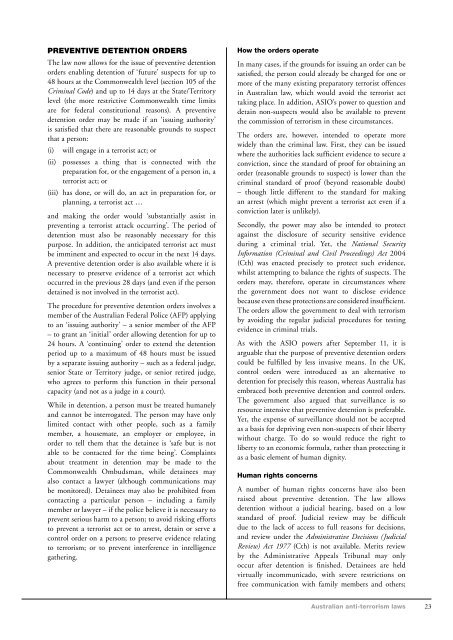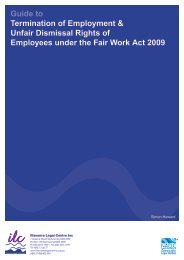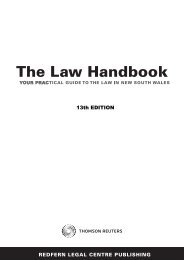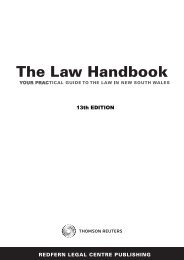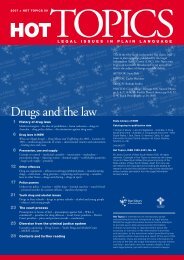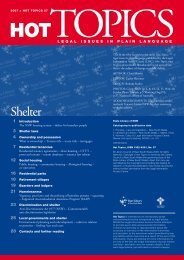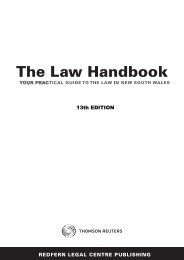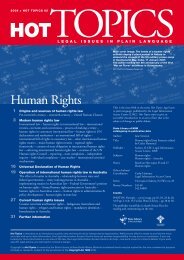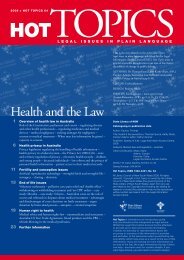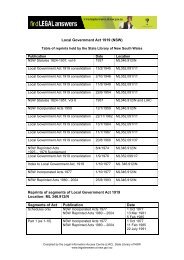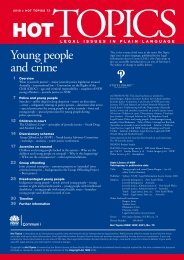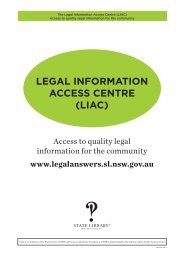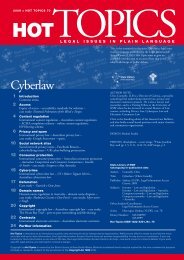Terrorism - Hot Topics 58 - Legal Information Access Centre
Terrorism - Hot Topics 58 - Legal Information Access Centre
Terrorism - Hot Topics 58 - Legal Information Access Centre
- No tags were found...
You also want an ePaper? Increase the reach of your titles
YUMPU automatically turns print PDFs into web optimized ePapers that Google loves.
prevenTive DeTenTiOn OrDersThe law now allows for the issue of preventive detentionorders enabling detention of ‘future’ suspects for up to48 hours at the Commonwealth level (section 105 of theCriminal Code) and up to 14 days at the State/Territorylevel (the more restrictive Commonwealth time limitsare for federal constitutional reasons). A preventivedetention order may be made if an ‘issuing authority’is satisfied that there are reasonable grounds to suspectthat a person:(i) will engage in a terrorist act; or(ii) possesses a thing that is connected with thepreparation for, or the engagement of a person in, aterrorist act; or(iii) has done, or will do, an act in preparation for, orplanning, a terrorist act …and making the order would ‘substantially assist inpreventing a terrorist attack occurring’. The period ofdetention must also be reasonably necessary for thispurpose. In addition, the anticipated terrorist act mustbe imminent and expected to occur in the next 14 days.A preventive detention order is also available where it isnecessary to preserve evidence of a terrorist act whichoccurred in the previous 28 days (and even if the persondetained is not involved in the terrorist act).The procedure for preventive detention orders involves amember of the Australian Federal Police (AFP) applyingto an ‘issuing authority’ – a senior member of the AFP– to grant an ‘initial’ order allowing detention for up to24 hours. A ‘continuing’ order to extend the detentionperiod up to a maximum of 48 hours must be issuedby a separate issuing authority – such as a federal judge,senior State or Territory judge, or senior retired judge,who agrees to perform this function in their personalcapacity (and not as a judge in a court).While in detention, a person must be treated humanelyand cannot be interrogated. The person may have onlylimited contact with other people, such as a familymember, a housemate, an employer or employee, inorder to tell them that the detainee is ‘safe but is notable to be contacted for the time being’. Complaintsabout treatment in detention may be made to theCommonwealth Ombudsman, while detainees mayalso contact a lawyer (although communications maybe monitored). Detainees may also be prohibited fromcontacting a particular person – including a familymember or lawyer – if the police believe it is necessary toprevent serious harm to a person; to avoid risking effortsto prevent a terrorist act or to arrest, detain or serve acontrol order on a person; to preserve evidence relatingto terrorism; or to prevent interference in intelligencegathering.how the orders operateIn many cases, if the grounds for issuing an order can besatisfied, the person could already be charged for one ormore of the many existing preparatory terrorist offencesin Australian law, which would avoid the terrorist acttaking place. In addition, ASIO’s power to question anddetain non-suspects would also be available to preventthe commission of terrorism in these circumstances.The orders are, however, intended to operate morewidely than the criminal law. First, they can be issuedwhere the authorities lack sufficient evidence to secure aconviction, since the standard of proof for obtaining anorder (reasonable grounds to suspect) is lower than thecriminal standard of proof (beyond reasonable doubt)– though little different to the standard for makingan arrest (which might prevent a terrorist act even if aconviction later is unlikely).Secondly, the power may also be intended to protectagainst the disclosure of security sensitive evidenceduring a criminal trial. Yet, the National Security<strong>Information</strong> (Criminal and Civil Proceedings) Act 2004(Cth) was enacted precisely to protect such evidence,whilst attempting to balance the rights of suspects. Theorders may, therefore, operate in circumstances wherethe government does not want to disclose evidencebecause even these protections are considered insufficient.The orders allow the government to deal with terrorismby avoiding the regular judicial procedures for testingevidence in criminal trials.As with the ASIO powers after September 11, it isarguable that the purpose of preventive detention orderscould be fulfilled by less invasive means. In the UK,control orders were introduced as an alternative todetention for precisely this reason, whereas Australia hasembraced both preventive detention and control orders.The government also argued that surveillance is soresource intensive that preventive detention is preferable.Yet, the expense of surveillance should not be acceptedas a basis for depriving even non-suspects of their libertywithout charge. To do so would reduce the right toliberty to an economic formula, rather than protecting itas a basic element of human dignity.human rights concernsA number of human rights concerns have also beenraised about preventive detention. The law allowsdetention without a judicial hearing, based on a lowstandard of proof. Judicial review may be difficultdue to the lack of access to full reasons for decisions,and review under the Administrative Decisions (JudicialReview) Act 1977 (Cth) is not available. Merits reviewby the Administrative Appeals Tribunal may onlyoccur after detention is finished. Detainees are heldvirtually incommunicado, with severe restrictions onfree communication with family members and others;australian anti-terrorism laws 23


